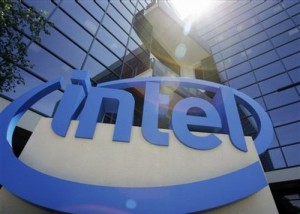 Intel’s upcoming Core i-series processors based on the Ivy Bridge architecture are being pitched at ultrabooks, but the company is now extending the chips to high-performance tablets with Microsoft’s upcoming Windows 8 operating system.
Intel’s upcoming Core i-series processors based on the Ivy Bridge architecture are being pitched at ultrabooks, but the company is now extending the chips to high-performance tablets with Microsoft’s upcoming Windows 8 operating system.
Intel hopes the new Ivy Bridge chips will make it to tablets, according to a slide from this week’s Intel Developer Forum trade show in Beijing. The slide shows one tablet with gaming controllers attached on both sides and another tablet with a keyboard attached to it.
The tablets will provide “leading performance,” Intel said on the slide. The tablets could have processors with up to four CPU cores, low-power memory and other power-saving features to extend battery life, according to the slide.
Intel until now had established a tablet strategy around low-power Atom chips. The company is due to release its latest tablet chips code-named Clover Trail later this year, which will help Windows 8 tablets offer more than nine hours of battery life.
Intel’s upcoming Ivy Bridge mobile processors have been mainly targeted at a new category of thin and light laptops called ultrabooks, which is a way for the company to combat its weakness in tablets. Intel is promoting ultrabooks as an alternative to tablets, as the lightweight laptops let users consume and create content. Intel is implementing some tablet features in Ivy Bridge ultrabooks, with some models meshing keyboards with features such as touchscreens, quick boot and instant connectivity.
Intel could not immediately comment on whether any device makers would offer those tablets. Intel has code-named the Ivy Bridge tablet platform Chief River, which is also the code-name for the upcoming ultrabook platform. The Chief River platform supports USB 3.0 and could also bring Thunderbolt ports to tablets.
Ivy Bridge tablets could be very similar in specifications to ultrabooks, just without the keyboard, said Dean McCarron, principal analyst at Mercury Research. Intel could be pushing the high-performance tablets to test new use cases of x86 devices.
“You are looking at an evolutionary step,” McCarron said. “Particularly in the x86 space, the evolution is more the convertible-type design where the keyboard is an optional piece,” McCarron said.
The tablet may appeal to customers who need the performance of a Core processor, but also need a more highly portable platform than is currently offered by laptops, McCarron said. Tablet use is on the rise in enterprises, and customers may want a high-performing device resembling a tablet with a separate keyboard.
The Core processors have specific on-chip features that provide the processors a performance and security edge over power-optimised Atom tablet chips. In addition to Windows 8, tablets with Core processors will improve graphics with DirectX 11, which is supported on the Ivy Bridge chipset.
McCarron didn’t know the specific tablet implementations Intel was targeting, but said the 7-series chipset accompanying Ivy Bridge processors could be tweaked for tablets. Enterprises are a better fit for Ivy Bridge tablets than gamers, who usually need high-resolution displays, refresh rates and graphics performance, McCarron said.
Most tablets today come with ARM processors, and ARM-based chip makers Nvidia and Qualcomm are targeting faster quad-core chips at tablets. ARM has an advantage on power consumption, while Intel is better on raw performance, analysts said.
Intel is throwing its weight behind its Atom and Ivy Bridge processors to see if it can gain some market share against ARM, said Jim McGregor, an independent chip analyst.
“They are going after every angle they can to get a foothold in a market,” McGregor said, adding that Intel has had limited success to date.
Gaming tablets with ARM are now available, and Intel may be targeting Ivy Bridge chips to disrupt ARM’s dominance in the area, McGregor said.
Intel is working with Microsoft on Windows 8 tablets, but also has a relationship with Google on Android so the chip maker will have to play its cards carefully, McGregor said. But the higher performance on Intel’s Ivy Bridge chips may be relevant for specific productivity applications on both operating systems compared to ARM.
“If they can find higher performance, then it’ll be to their advantage,” McGregor said.





